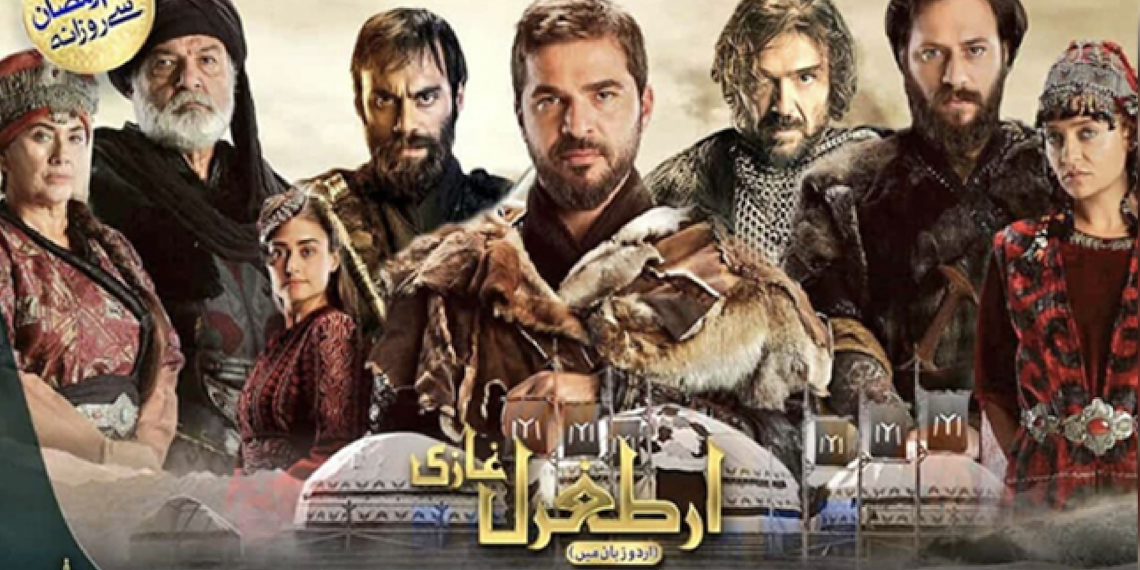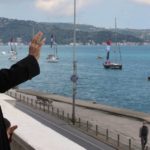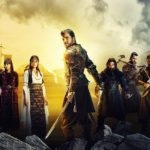Turkish TV series Ertugrul Ghazi (Dirilis: Ertugrul in Turkish and Resurrection: Ertugrul in English) is an international hit, but it has found unprecedented acclaim and fandom in Pakistan, where it is broadcast in the country’s national language (Urdu) by the state-owned Pakistan Television Corporation (PTV).
The highly politicized, Ottomanist themes of Ertugrul Ghazi, a Turkish television drama, are a manifestation of Turkey’s desire to expand its cultural borders. The show depicts Turks as the protagonists dealing with contemporary political issues, “settling” accounts with their enemies as they steadfastly practise the faith of Islam. These ideals facilitates the construction of a transnational populist civilizational cultural identity which surpasses nationalism. The show and its themes have resonated with the Pakistani version of Islamist populism.
During Pakistan’s first reluctant Covid-19 lockdown, in the spring of 2020, the normally chaotic streets went quiet. The relative tranquillity of the outdoors was not replicated indoors. Thousands of Pakistanis, forced to stay home, were glued to their television screens and electronic devices, enthusiastically watching a Turkish TV series: Ertugrul Ghazi (Dirilis: Ertugrul in Turkish and Resurrection: Ertugrul in English) (Shaikh, 2020; Carney, 2018). The program is an international hit, but it has found unprecedented acclaim and fandom in Pakistan, where it is broadcast in the country’s national language (Urdu) by the state-owned Pakistan Television Corporation (PTV). By fall 2020, the show’s Urdu YouTube channel—called TRT Ertugrul by PTV—had received 10 million subscribers; the show also became a regular feature of the “top ten shows” watched on Netflix in Pakistan (Bhutto, 2020; The News, 2020).
Imran Khan, Pakistan’s Islamist populist Prime Minister (Yilmaz & Shakil, 2021a; Yilmaz & Shakil, 2021b), called the show a “gift” from Turkey that was a token of brotherly exchange between the two countries. He has highlighted the significance of the show for the “Muslim world” because it allows a break from the “Western” content and puts forth “our (the Muslim world’s)” perspectives (Haider, 2020). Khan feels that the medium of films should be used to teach the “aloof” and “West-inspired” younger generations about the Muslim world’s “glorious past,” “triumphs,” and “heroic figures,” so that the “western civilizational hegemony” is “broken” (Haider, 2020). As a counter to “third-hand culture,” Ertugrul Ghazi has gone beyond pop culture to seep into deep fissures with Pakistani society’s imagination and conception of Turkey (Banka, 2020).
The fictional multi-series drama is built around the character of Ertugrul, the father of Osman I (the founder of the Ottoman Empire) and follows Ertugrul’s adventures across Central Asia. The story is a genre of historical fiction that celebrates the “resurrection” of Muslim power in the region during the late 11th century. The series has achieved unprecedented viewership in Pakistan, where the citizens have always felt a close affinity or a sense of “brotherhood” towards Turkey.
Northern India and Pakistan have been heavily shaped by Turkic-Persian culture. Turkish cultural influences in the Indus region—present-day Pakistan—run deep. Five different dynasties hailing from the region of modern-day Turkey and Central Asia, cumulatively known as the Delhi Sultanate, ruled the Indus valley from 1000 to 1556 BC (Avari, 2016). The longstanding connection between the cultures is also visible in the Urdu language. The language was constructed by borrowed vocabulary from the dominant languages within India from the Medieval period (Shaban, 2015). Urdu’s foundational elements include not only Persian, Hindi, and Arabic influences but also Turkish, further proving the transfusion and integration of Turkic elements into the region’s culture (Shaban, 2015).
In contemporary history, the Muslims of South Asia were very deeply involved in efforts to sustain the Ottoman Empire as it reached its twilight during and post-World War I. The Muslims of United India held the Ottoman ruler as the caliph of the Muslim World, and the Ottomans wielded immense religious-cultural power in the region. Thousands of Muslims protested, petitioned, and even enlisted in the British army during WWI with the hopes of negotiating a secure fate for the Ottoman Empire. However, the Treaty of Sèvres (1920) brought an end to these ambitions (Niemeijer, 1972).
During the 20th century, the modern-day nation-states of Turkey and Pakistan maintained cordial ties with one another. To show it supports Turkey—even on the most controversial issues—Pakistan is one of a handful of countries that do not recognize the legitimacy of the Armenian state and deny the Armenian Genocide (Korybko, 2020). Both countries have had numerous high-level state official visits from the other. In the first decades of the twenty-first century, and in particular post-2010, relations between the two countries have only intensified through bilateral trade, military exchanges, diplomatic support, and cultural integration supported by shows such as Ertugrul (Khetran, 2016; Singh & Hickman, 2013; Mushtaq, 2004).
The large audience for the show, in a country already sympathetic to Turkey, makes it a highly useful devise for transmitting the religious populism of Recep Tayyip Erdogan and his political party the Justice and Development Party (AKP). The show is a prime example of the AKP’s soft power, allowing the party to successfully transmit its narrative of “Islamist civilisationalism” (Yilmaz, 2021), rooted in glorification of the Turkic ethnicity and position as the guardians of the Sunni Muslim world, the show blurs the “distinctions between entertainment and official (state-sanctioned) history” (Smith, 2020; Subramanian, 2020; Carney, 2018; Karataş, 2016).
The drama’s highly politicized themes of Ottomanism are a manifestation of Turkey’s desire to expand its cultural borders. The show depicts Turks as the protagonists dealing with contemporary political issues, “settling” accounts with their enemies as they steadfastly practise the faith of Islam (Sunni Islam) (Bhutto, 2020; Emre-Çetin, 2014). These broadcasted ideals facilitate the construction of a transnational populist civilizational cultural identity, where nationalism is surpassed (Brubaker, 2017). This has resonated with the Pakistani version of Islamist populism (Yilmaz & Saleem, 2021). Khan’s ownership of Ertugrul Ghazi as “our” culture exemplifies this notion.
The hallmark of populism is a dichotomous society, home of two homogeneous and antagonistic groups—“the pure people” versus “the corrupt elite” (Mudde, 2004). The show plays on this dichotomy, allowing Pakistani viewers to feel part of the Muslim ummah—a group that has been victimized by the whims and control of the “Western world”; throughout the show, Ertugrul is busy unmasking the nefarious plans of Crusaders, pagans, and internal traitors. The ummah is only salvaged from the brink of misery and oppression due to their strong Islamist ideals that are imbodied in a jihad of nafs (the inner self) and sword (enemies of Islam, both internal and external).
Erdogan and his party have hooked the willing Pakistani audience, a population suffering a perpetual ontological crisis (Bhutto, 2020 & Shaikh, 2020). The vertical and horizontal divides (Taguieff, 1995) within Pakistan are also cemented through the show’s themes. The vertical dimension of Islamic populism divides the “ummah” versus the “others,” such as Western countries, Jews, Indians, Armenians, etc. While the horizontal dimension marks the ummah as the “true people”due to their celestial superiority (Islamism) against the “evil” or “godless” others. Civilizational populism is intertwined with faith within the drama series. Superseding plain nationalism, civilizationism—especially driven by populist actors—is a highly effective emotional instrument of division and can be used to galvanize popular support in the international arena.
Turkey has used its transnational civilizationism to not only expand its relations with Pakistan but also muster support during the Nagorno-Karabakh war. While Pakistan didn’t officially declare its military involvement in the conflict, troops supported the Turkey-backed army in Azerbaijan. The Pakistani government issued sympathetic statements of support for its Azerbaijani “brothers” (Korybko, 2020). Turkey, Azerbaijan, and Pakistan share a transnational relationship that makes them the ummah against the “infidels.”
On the domestic level, Ertugrul Ghazi has made Pakistani and Turkish cultures synonymous. This penetration of civilizational populism is cross-cutting. For now, markets are flooded with fan merchandise, including odd items such Halima Sultan hairpins and Ertugrul themed papads (a snack), with the show’s Turkish cast endorsing brands across Pakistan’s cities. However, there are clear signs of a cultural convergence that are beyond the show and have more permanent features. The long-term cultural ties feature not only telecasting more Islamized Turkish shows such as Yunus Emre[1] but also jointly produced television shows—for example, Lala Turki[2] (Rehman, 2021; Siddique, 2020). This show, a sequel to the show Kurulus: Osman, has been dubbed in Urdu by a YouTube channel and is being consumed with great zeal (The News, 2020). Retail brands are not just limiting themselves to the cast of Ertugrul Ghazi; rather, they are using slogans such as “uniting cultures” and “Muslim heritage” to sell their merchandise in a market where Turkishness is the new fad (Saleem, 2020).
A chowk (market area) has always been named the “Istanbul chowk,” but now its connotation has changed for the citizens of Pakistan. The name of Istanbul reminds them of the Hagia Sophia, that was just “reconquered” by the AKP government, when it was re-converted to a mosque (Yilmaz, 2020). Istanbul chowk now represents the land of the “true” and “fierce” Muslims, the land and progenies of Ertugrul Ghazi (the pious warrior Turk) who took on the world to defend his tribe and religion. The drama series has played a key role in solidifying transnational Islamist populism promulgated by the Erdogan regime. The show’s civilizationalism is now part of Pakistan’s collective narrative, identity, and psyche.
By Ihsan Yilmaz & Kainat Shakil
Source: ECPS
References
Avari, B. (2016). Islamic Civilization in South Asia: A History of Muslim Power and Presence. Routledge: New York. (accessed on March 14, 2021).
Brubaker, R. (2017). “Between nationalism and civilizationism: the European populist moment in comparative perspective.” Ethnic and Racial Studies. 40(8), 1191–1226.
Carney, J. (2018.) “Resur(e)recting a Spectacular Hero: Diriliş Ertuğrul, Necropolitics, and Popular Culture in Turkey.” Review of Middle East Studies. 52(1), 93-114. doi:10.1017/rms.2018.6.
Khetran, S. Mir. (2016). “Economic Connectivity: Pakistan, China, West Asia and Central Asia.” Strategic Studies. 36(4), 61-76. doi:10.2307/48535974
Mudde, C. (2004). “The Populist Zeitgeist.” Government and Opposition. 39(4), 541–563.
Mushtaq, Nadia. (2004). “Pak-Turkey Relations: Towards Cooperative Future.” Strategic Studies. 24(2), 89-116. doi:10.2307/45242527.
Niemeijer, A. (1972.) The Khilafat Movement in India 1919-1924. Brill: The Hague.
Shaban, Abdul. (2015). “Urdu and Urdu Medium Schools in Maharashtra.” Economic and Political Weekly. 50(29), 46-51. doi:10.2307/24482034.
Singh, Chaitram & Hickman, John. (2013). “Soldiers as Savior of the State: The Cases of Turkey and Pakistan Contrasted.” Journal of Third World Studies. 30(1), 39-54, doi:10.2307/45198798.
Taguieff, P. (1995). “Political Science Confronts Populism: From a Conceptual Mirage to a Real Problem.” Telos. 103, 9–43. Doi: 10.3817/0395103009.
Yilmaz, Ihsan. (2021). Creating the Desired Citizens: State, Islam and Ideology in Turkey. Cambridge and New York: Cambridge University Press, 2021.
[1] The show is based on the life of the 13th century Sufi mystic. It emphasizes the universal components and yardsticks of Muslimhood.
[2] Abdur Rahman Peshawari (a South Asian Muslim) had gathered funds and men to aid the flailing Ottoman Empire. Lala Peshawari, as he was known at the time, then set off on a ship; upon reaching Turkey, he fought two battles as part of the Ottoman army. He was killed in a battle and thus is revered as a “Ghazi.” The show will be based off this journey to the Ottoman Empire and his sacrifices for the caliphate.



